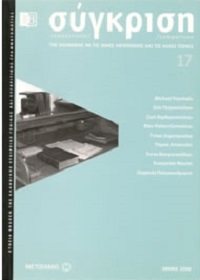Ancient Greece as "sameness" in Greek Children's Literature and as "otherness" in Disney's comics
Abstract
The construction of the Greek national identity was based on the inalienable right of modern Greeks to assert their place as legal heirs of their ancient culture, against the Europeans, who questioned it. Literature in general and children's literature in particular are inscribed on the sphere of the enforcement and authenticitation of any national identity and consequently of the Greek one. Ancient Greece, either in a straight-out way or ambiguously present, haunts the greek cultural and literary production and constitutes an organic component of it. The myth of greekness on children's Literature, even on an iconographie level, is portrayed through a specific "indigenous popular classicism". The crucial argument for almost the most part of greek children's literature has always been the enhancement of the Greek identity and the unification of the national characteristics on a way that praises the homogeneity and the continuity of the greek virtues. Children's literature and national identity are cross-fertilized through a mutual solidarity.
On the other hand , Disney uses ancient Greece in order to diffuse imperceptibly his own -and his social class'- ideals and beliefs, by attributing them to the outmost and sanctificated past. Through certain mechanisms (fetishization, misappropriation and manipulation) he imposes his re-reading of the past and he distorts ancient Greece's status to justify the American Dream (from rags to reaches). By forging history and by camouflaging his intentions, through his friendly and familiar Comics "for children", he manages to subvert ancient Greece's principles and to place it on a contrapuntal position, making Greece the "other" against which the American identity is being formulated. Furthermore, at the same time, ancient Greece is being obliterated through its americanisation.
Article Details
- How to Cite
-
Μουλά Ε. (2017). Ancient Greece as "sameness" in Greek Children’s Literature and as "otherness" in Disney’s comics. Comparison, 17, 159–178. https://doi.org/10.12681/comparison.10220
- Issue
- Vol. 17 (2006)
- Section
- Articles

This work is licensed under a Creative Commons Attribution-NonCommercial-ShareAlike 4.0 International License.
Authors who publish with this journal agree to the following terms:
- Authors retain copyright and grant the journal right of first publication with the work simultaneously licensed under a Creative Commons Attribution Non-Commercial License that allows others to share the work with an acknowledgement of the work's authorship and initial publication in this journal.
- Authors are able to enter into separate, additional contractual arrangements for the non-exclusive distribution of the journal's published version of the work (e.g. post it to an institutional repository or publish it in a book), with an acknowledgement of its initial publication in this journal.
- Authors are permitted and encouraged to post their work online (preferably in institutional repositories or on their website) prior to and during the submission process, as it can lead to productive exchanges, as well as earlier and greater citation of published work (See The Effect of Open Access).



